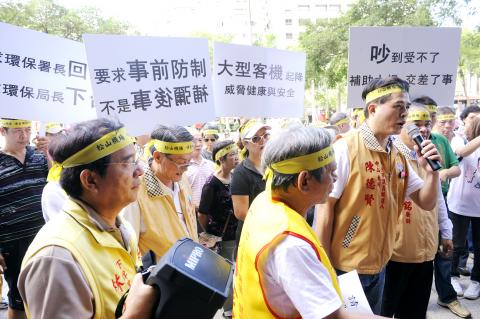Residents living close to Taipei Songshan Airport protested outside the Environmental Protection Administration (EPA) yesterday, saying the government should compensate them as quickly as possible for tolerating noise caused by landing and departing aircraft.
The protesters, led by candidate for Taipei City councilor Chen Teh-sien (陳德賢) of the Taiwan Solidarity Union, were mainly from Datong (大同) and Zhongshan (中山) districts. They said the Civil Aeronautics Administration (CAA) had promised it would compensate 100 households living in the designated noise control zone every year by installing soundproof facilities.
“There are about 100,000 households located in the noise control zone,” the protesters said in a statement. “However, 10 years have passed and only 5,092 households have been compensated.”

Photo: George Tsorng, Taipei Times
The protesters said decibel levels measured by the CAA at selected locations were much lower than those measured by the residents themselves. They said noise pollution would be much higher when direct flights between -Songshan and Tokyo’s Haneda airports are launched later this month.
“The noise from the airport has caused long-term damage to the residents’ health,” Chen said. “Taipei City’s Department of Environmental Protection is responsible for executing the installation of soundproof facilities and should not pass the buck. It obviously has colluded with the CAA by only recognizing the standards that the CAA set for giving out compensation.”
The EPA said it would soon organize a meeting which the CAA and residents could attend to talk about solutions.
“We will focus on two things. One will be the actions taken by the CAA to reduce the noise generated by aircraft landing and taking off and the other will be to see if there is any other way to make soundproof facilities available sooner,” said Hsieh Yein-rui (謝燕儒), director of the EPA’s Air Quality Protection and Noise Control Department.
Hsieh said compensation for noise control was funded by aircraft landing fees paid by the airlines using Taipei Songshan Airport. To facilitate the installation of soundproof facilities, the Department of Environmental Protection has divided the residents into three categories based on decibel measurements. Those living in the Category III area, which has a measured decibel of 75 or above, will be given priority, followed by those in the Category II and Category I areas respectively.
EPA statistics showed the CAA has yet to finish the installation of soundproof facilities in Category III areas.
“In the past, Songshan could collect aircraft landing fees of about NT$100 million [US$3.25 million] per year,” Hsieh said. “The launch of the high-speed rail service hurt domestic flight services badly, which in turn caused the landing charge to drop drastically to approximately NT$30 million per year.”
The CAA said the locations where noise levels were measured were determined by the CAA, the department as well as local residents and, therefore, cannot call the shots.
Statistics from the CAA showed that approximately NT$1.5 billion has been spent on noise control between 2000 and this year and NT$900 million was used for the installation of soundproof facilities.
A total of 5,165 households in the noise control zone are qualified for compensation for soundproof facilities. So far, 50 have yet to have them installed, the CAA said.

Chinese spouse and influencer Guan Guan’s (關關) residency permit has been revoked for repeatedly posting pro-China videos that threaten national security, the National Immigration Agency confirmed today. Guan Guan has said many controversial statements in her videos posted to Douyin (抖音), including “the red flag will soon be painted all over Taiwan” and “Taiwan is an inseparable part of China,” and expressing hope for expedited reunification. The agency last year received multiple reports alleging that Guan Guan had advocated for armed reunification. After verifying the reports, the agency last month issued a notice requiring her to appear and explain her actions. Guan

GIVE AND TAKE: Blood demand continues to rise each year, while fewer young donors are available due to the nation’s falling birthrate, a doctor said Blood donors can redeem points earned from donations to obtain limited edition Formosan black bear travel mugs, the Kaohsiung Blood Center said yesterday, as it announced a goal of stocking 20,000 units of blood prior to the Lunar New Year. The last month of the lunar year is National Blood Donation Month, when local centers seek to stockpile blood for use during the Lunar New Year holiday. The blood demand in southern Taiwan — including Tainan and Kaohsiung, as well as Chiayi, Pingtung, Penghu and Taitung counties — is about 2,000 units per day, the center said. The donation campaign aims to boost

The Kaohsiung Tourism Bureau audited six hotels in an effort to prevent price gouging ahead of Korean band BTS’ concert tour in the city scheduled for Nov. 19, 21 and 22 this year. The bureau on Friday said that the audits — conducted in response to allegations of unfair pricing posted on social media — found no wrongdoing. These establishments included the local branches of Chateau de Chine, Hotel Nikko, My Humble House, and Grand Hai Lai, it said, adding that the Consumer Protection Commission would have penalized price gougers had the accusations been substantiated. The bureau said the Tourism Development Act

The Central Weather Administration (CWA) said a magnitude 4.9 earthquake that struck off the coast of eastern Taiwan yesterday was an independent event and part of a stress-adjustment process. The earthquake occurred at 4:47pm, with its epicenter at sea about 45.4km south of Yilan County Hall at a depth of 5.9km, the CWA said. The quake's intensity, which gauges the actual effects of a temblor, was highest in several townships in Yilan and neighboring Hualien County, where it measured 4 on Taiwan's seven-tier intensity scale, the CWA said. Lin Po-yu (林柏佑), a division chief at the CWA's Seismological Center, told a news conference